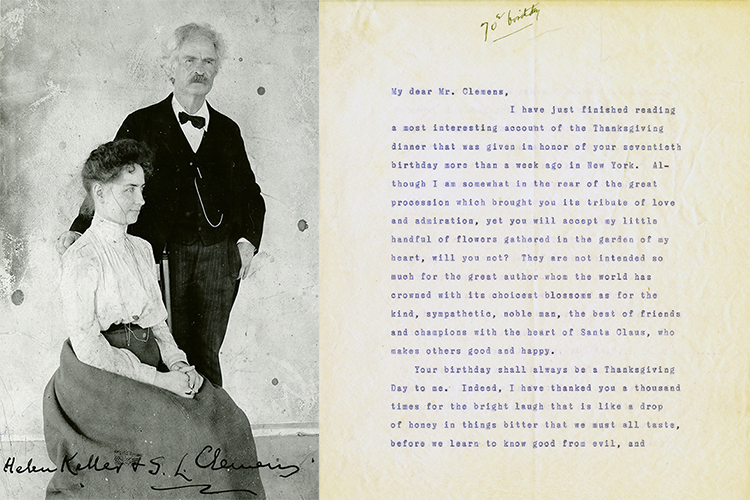New library project explores Mark Twain’s famous friendships
The project, "Six degrees of Mark Twain," has pulled from a vast collection of the library’s Mark Twain Papers and Project to explore how Twain’s life intersected with six notable people, from Helen Keller to Frederick Douglass

January 1, 2020
Throughout his life, American writer and humorist Samuel Langhorne Clemens, better known by his pen name, Mark Twain, formed friendships with many notable figures in history that shaped his work and the way he saw the world.

In a letter written by P.T. Barnum to Mark Twain, postmarked July 31, 1874, Barnum promises to save strange letters for the author. (Letter courtesy of the Mark Twain Papers and Project)
A new multimedia project published by the UC Berkeley Library, “Six degrees of Mark Twain,” has pulled from a vast collection of the library’s Mark Twain Papers and Project — the largest collection of Twain’s private writings and manuscripts — to explore how Twain’s life intersected with six people: P.T. Barnum, Nikola Tesla, Helen Keller, Frederick Douglass, Harriet Beecher Stowe and Ulysses S. Grant.
The project includes personal letters and photos from Twain’s life, essays unpublished in Twain’s lifetime, excerpts from his autobiography, as well as audio and video commentary by Robert Hirst, general editor of the Mark Twain Papers and Project.
In one letter featured in the project, Twain writes to U.S. President James Garfield in 1881 before his inauguration, asking him to keep Douglass — who escaped slavery and went on to move the world as an author, orator and abolitionist — in office. (Douglass had been appointed as U.S. marshal of the District of Columbia by President Hayes in 1877.)
“I offer this petition with peculiar pleasure & strong desire, because I so honor this man’s high & blemishless character & so admire his brave long crusade for the liberties & elevation of his race,” Twain wrote about Douglass. “He is a personal friend of mine, but that is nothing to the point — his history would move me to say these things, without that. And to feel them, too.”
Garfield went on to appoint Douglass as the first recorder of deeds for the District of Columbia.
Twain dictated his entire autobiography, leaving behind 5,000 typewritten pages of memoirs. Twain, who died on April 21, 1910, asked that the text not be published until 100 years after his death to allow him “to speak freely from the grave.” The Mark Twain Papers and Project editors, who compiled and annotated the memoirs, published the full, authoritative edition in three volumes, starting in 2010.

Left: Helen Keller with Mark Twain in 1895. Right: The first page of a letter that Keller wrote to Twain for his 70th birthday. (Photo courtesy of the Franklin J. Meine Collection, University of Chicago and the Mark Twain Papers and Project; letter courtesy of the Mark Twain Papers and Project)
In an excerpt from his autobiography, Twain writes about Keller, who lost her ability to see and hear at 18 months old and learned to communicate through specialized sign language and, eventually, her own voice.
“She is fellow to Caesar, Alexander, Napoleon, Homer, Shakespeare and the rest of the immortals. It has taken all the ages to produce a Helen Keller — and a Miss Sullivan … Seen once, the moving and eloquent play of emotion in her face is forever unforgettable. I have not seen the like of it in any other face, and shall not, I know.”
Read more about Twain’s friendships in the UC Berkeley Library’s “Six degrees of Mark Twain.”
Learn more about the Mark Twain Papers and Project.